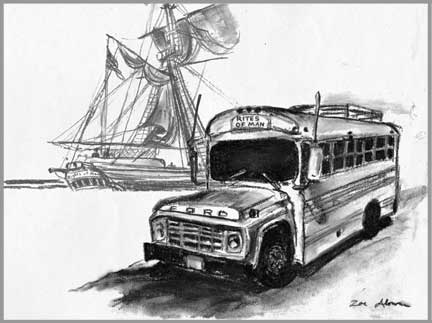
We call the CLEU bus, “The Rites of Man,” after the name of a ship in Herman Melville’s novella, “Billy Budd.” We spell the word “rights” as “rites” to make the association with what we call “Human Rites.”
In the following passage, young Billy Budd has just been “pressed” into service of a navy at war, transferred from a merchant ship called “The Rights of Man” to a warship called “The Indomitable”:
“The transfer from chest to bag was made. And, after seeing his man into the cutter and then following him down, the lieutenant pushed off from the Rights-of-Man. That was the merchant ship’s name, though by her master and crew abbreviated in sailor fashion into The Rights. The hardheaded Dundee owner was a staunch admirer of Thomas Paine, whose book in rejoinder to Burke’s arraignment of the French Revolution had then been published for some time and gone everywhere. In christening his vessel after the title of Paine’s volume, the man of Dundee was something like his contemporary shipowner, Stephen Girard of Philadelphia, whose sympathies, alike with his native land and its liberal philosophers, he evinced by naming his ships after Voltaire, Diderot, and so forth.
But now, when the boat swept under the merchantman’s stern, and officer and oarsmen were noting– some bitterly and others with a grin– the name emblazoned there, just then it was that the new recruit jumped up from the bow where the coxswain had directed him to sit, and waving his hat to his silent shipmates sorrowfully looking over at him from the taffrail, bade the lads a genial good-bye. Then, making a salutation as to the ship herself, ‘And good-bye to you too, old Rights of Man.’
‘Down, sir!’ roared the lieutenant, instantly assuming all the rigor of his rank, though with difficulty repressing a smile.
To be sure, Billy’s action was a terrible breach of naval decorum, but in that decorum he had never been instructed, in consideration of which the lieutenant would hardly have been so energetic in reproof but for the concluding farewell to the ship. This he rather took as meant to convey a covert sally on the new recruit’s part, a sly slur at impressment in general, and that of himself in especial. And yet, more likely, if satire it was in effect, it was hardly so by intention, for Billy, though happily endowed with the gaiety of high health, youth, and a free heart, was yet by no means of a satirical turn, The will to it and the sinister dexterity were alike wanting. To deal in double meanings and insinuations of any sort was quite foreign to his nature.”
